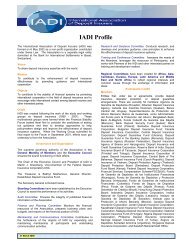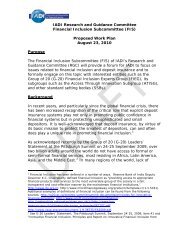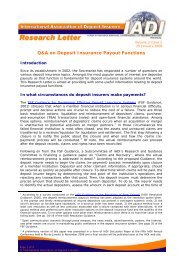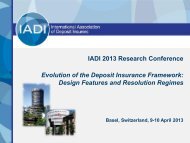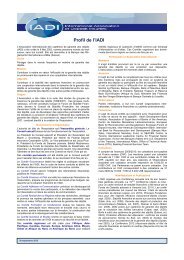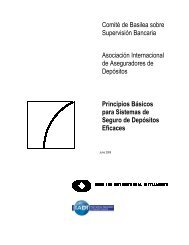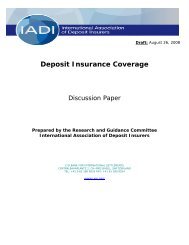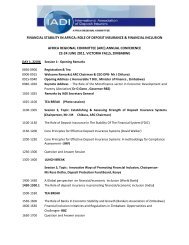Volume II - PDF - International Association of Deposit Insurers
Volume II - PDF - International Association of Deposit Insurers
Volume II - PDF - International Association of Deposit Insurers
- No tags were found...
You also want an ePaper? Increase the reach of your titles
YUMPU automatically turns print PDFs into web optimized ePapers that Google loves.
•BACKGROUND DOCUMENTS•<br />
Part I: Research<br />
Communication and complaints<br />
Communication is crucial to the reimbursement<br />
process. Immediately following an institution’s<br />
closure, the public should receive practical and<br />
accurate information about: when and how depositors<br />
can expect to receive their money (the reimbursement<br />
schedule), what depositors are expected<br />
to do in order to receive their reimbursement, and<br />
who depositors can contact for further information<br />
or clarification.<br />
Frequent and regular updates regarding the<br />
proceedings, the latest reimbursement statistics,<br />
and any problems that would delay the process are<br />
advisable. Information can be disseminated through<br />
direct communication with depositors, press<br />
releases, the news media, advertisements, posters,<br />
the Internet, or any other available means. Direct<br />
communication through letters or telephone calls<br />
may be necessary in order to notify depositors<br />
about the availability <strong>of</strong> their money, to request<br />
further documentation to qualify for insurance<br />
coverage, or to answer depositors’ questions or<br />
complaints. In the experience <strong>of</strong> many deposit<br />
insurers, there generally are two types <strong>of</strong> complaints—those<br />
regarding coverage and those<br />
regarding the quality <strong>of</strong> service. Coverage questions<br />
must be dealt with through a legal investigation to<br />
decide whether the dispute is valid. Complaints<br />
regarding the quality <strong>of</strong> service should be handled<br />
expeditiously and with the utmost empathy.<br />
Handling such complaints may be easier and more<br />
efficient if the deposit insurer already has established<br />
service standards.<br />
Monitoring and follow-up<br />
Continuous monitoring <strong>of</strong> the reimbursement<br />
process is advisable so that adjustments may be made<br />
if necessary. For example, if the reimbursement<br />
process will take weeks or months to complete,<br />
special care should be taken so that the deposit<br />
insurer is not accused <strong>of</strong> giving some depositors or<br />
group <strong>of</strong> depositors favourable treatment.<br />
Some follow-up tasks should be noted. Submitting<br />
the reimbursement process to an independent<br />
auditor may be advisable, especially if the regulations<br />
and supporting s<strong>of</strong>tware did not undergo an<br />
audit before application. In some cases, the deposit<br />
insurer also will need to submit its claim as creditor<br />
<strong>of</strong> the closed institution to the liquidator in<br />
compliance with the subrogation rules specifying<br />
the amounts reimbursed and the indemnification<br />
obligation not yet settled. Finally, the deposit<br />
insurer may need to undertake some efforts to<br />
locate depositors whose reimbursement was<br />
unsuccessful during the normal process.<br />
Preparations for the<br />
Reimbursement Process<br />
The reimbursement process will benefit not only<br />
from having adequate legal and financial elements<br />
in place, but also from undertaking preparations<br />
to ensure that information systems are in place<br />
and that human resources are identified who can<br />
handle the task.<br />
Legal provisions<br />
Review <strong>of</strong> the experiences <strong>of</strong> past reimbursement<br />
cases are an important task and should include<br />
consideration <strong>of</strong> the adequacy <strong>of</strong> legal provisions.<br />
If such provisions are found to be lacking, then<br />
initiation <strong>of</strong> amendments to the law is advisable.<br />
Improving the quality <strong>of</strong> bank records<br />
To facilitate the determination <strong>of</strong> the proper<br />
amount <strong>of</strong> insurance coverage, the implementation<br />
and enforcement <strong>of</strong> a requirement for highquality<br />
standards in bank record keeping is very<br />
important. As long as the quality <strong>of</strong> a closed<br />
institution’s records is sufficiently good, it is<br />
possible, in a reasonable period <strong>of</strong> time, to obtain<br />
a clear picture <strong>of</strong> the deposit insurer’s obligations.<br />
In a number <strong>of</strong> countries, it is the role <strong>of</strong> the<br />
supervisory authority—as the proxy for the deposit<br />
insurer—to monitor the adequacy <strong>of</strong> the institutions’<br />
information systems. In other countries,<br />
this is the role <strong>of</strong> the deposit insurer. Regardless,<br />
it is important that the deposit insurer and the<br />
66<br />
Guidance for Developing Effective <strong>Deposit</strong> Insurance Systems: <strong>Volume</strong> <strong>II</strong>



